China Celebs
A Pair of Socks for US$100? A Livestream Session Exposing Wealth Inequality in Chinese Society
A casual remark made by Chinese actress Zhang Yuqi regarding the price of socks has ignited discussions surrounding the stark disparity between the perspectives of celebrities and the financial realities experienced by ordinary individuals.
Published
1 year agoon
By
Zilan Qian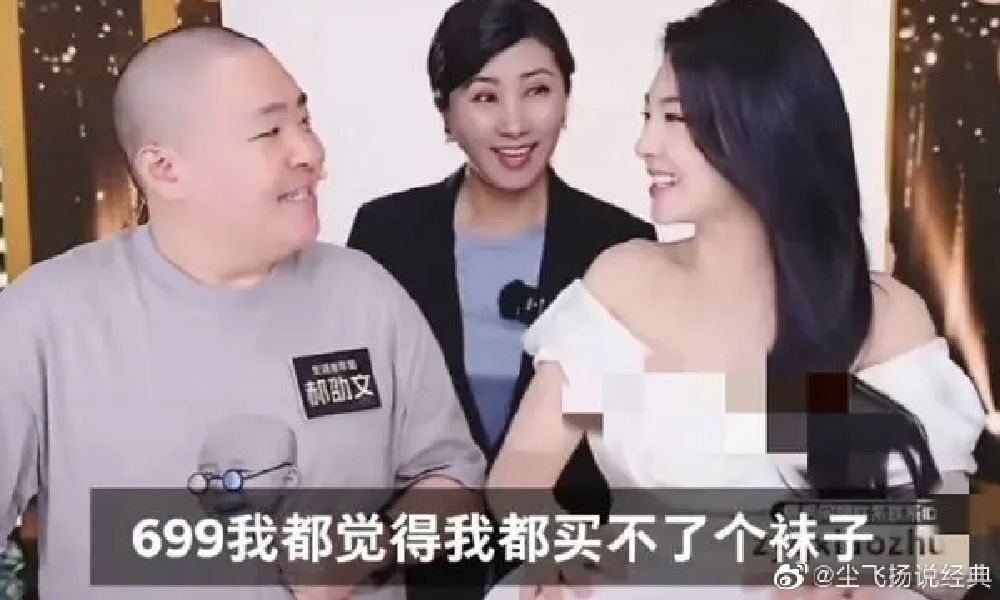
Amidst rising joblessness, surging prices, and economic challenges in China, it is not easy to get by for many people. So when Chinese actress Zhang Yuqi (张雨绮) recently suggested that 699 yuan (about US$100) would not be enough money to buy a pair of socks, her comment sparked discussions about celebrities flaunting their wealth and income inequality.
The incident took place during a live broadcast where Zhang Yuqi was participating in product sales alongside guest speaker Hao Shaowen (郝劭文). The focus of the broadcast was a luxury cashmere blanket priced at 1,699 yuan ($238). In the course of the session, Hao proposed reducing the price to 699 yuan ($100). In response, Zhang Yuqi made the remark, “699 yuan? I don’t even think I can buy a pair of socks with that amount.”
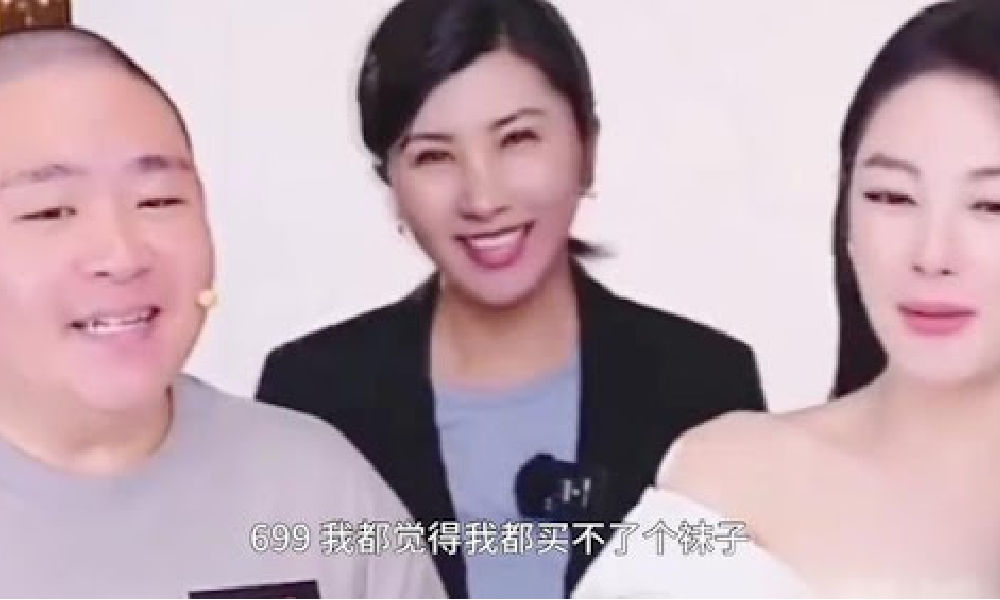
Screenshot of the live stream session when Zhang said “699 yuan? I don’t even think I can buy a pair of socks with that amount” (source).
Hao continued to emphasize that 699 yuan was already an excellent offer, highlighting the high cost of wool. Zhang echoed his sentiment, emphasizing the exorbitant price of wool. Eventually, the price of the blanket was further discounted to 369 yuan ($51) for a 1.5-meter size cashmere blanket.
Zhang Yuqi’s statement about 699 yuan not being sufficient to buy a pair of socks quickly grabbed attention online, leading to intense debates.

A screenshot of Zhang’s Weibo post on June 11th. Zhang apologized and explained that her intention was misunderstood due to her failure to effectively communicate her point.
On June 11th, Zhang issued an apology for her remark, explaining that her intention was to highlight the high cost of wool and that certain wool socks cannot be obtained for 699 yuan (#张雨绮致歉#). However, despite her apology, the discussions surrounding the incident did not subside.
“Zhang Yuqi doesn’t need to apologize. 699 yuan [$100] is truly not enough for celebrities to buy a pair of socks”
What was Zhang’s intention behind the controversial statement? Some individuals view Zhang’s comment as a calculated move designed to showcase her wealth.
Associate Professor Liu Chunshen from the Central University of Finance and Economics suggested that such a remark could be a tactic employed by celebrities to display their extravagant lifestyles and attract attention, which could potentially translate into financial gains (#学者称明星不该边赚钱边说风凉话#).
On the other hand, some argue that Zhang’s statement simply reflects the inherent luxury associated with the everyday lives of celebrities. One Weibo user shared a series of photos showcasing the prices of handbags, watches, and hats worn by various celebrities as part of their personal outfits.
The examples included jeans worn by Chinese actress Angelababy priced at 48,500 yuan ($6,805) and Chinese singer Roy Wang’s watch priced at a staggering 16.8 million yuan ($2,357,230).

One of the photos included in the Weibo post. The photo shows Angelababy’s personal outfit she wore at the airport on June 2nd, 2023, which includes a Hermès Faubourg Birkin handbag of around 2 million yuan (about $280,000), a Celine cap of 3700 yuan ($520), and a pair of Louis Vuitton shoes of 10000 yuan ($1400).
In the accompanying post, the Weibo user wrote, “Zhang Yuqi doesn’t need to apologize. 699 yuan is truly not enough for celebrities to buy a pair of socks,” implying that the seemingly exorbitant price of the socks is just a regular expense for these celebrities when compared to the extravagant items they commonly wear in their daily lives.
“Celebrities have attained an income level that is unimaginable for ordinary individuals in China”
Amidst the varying interpretations of Zhang’s statement, there is widespread agreement among netizens that the significant income gap is the primary driving force behind the online discussions.
Professor Liu, in his analysis of the incident, also asserts that income inequality is the core reason why netizens find Zhang’s statement unacceptable. Likewise, Weibo users who believe that Zhang had no intention to flaunt her wealth also acknowledge that celebrities have attained an income level that is unimaginable for ordinary individuals in China.
The potential earnings of celebrities have been a topic of discussion, with a prevailing consensus suggesting that they can earn approximately 2.08 million yuan (about $291,000) per day. This estimation originated from actress Zheng Shuang’s alleged earnings of 160 million yuan ($22.35 million) for the film A Chinese Ghost Story (倩女幽魂), averaging around 2.08 million yuan per day over a span of 77 days.
While Zheng’s case may be regarded as somewhat exceptional, it is widely known that celebrities earn substantial incomes. Reports of various celebrities earning 100 million yuan ($14 million) in six years, 8 million yuan ($1.1 million) in four days, or 1.8 million yuan ($252,000) per episode have been extensively circulated in recent years.
In stark contrast, the disposable income of residents nationwide was 36,882 yuan (about $5,100) in 2022, according to the National Bureau of Statistics of China.
“Chinese actor Wang Chuanjun shared he only had 1 million yuan ($140,000) left in his bank account, which caused him great distress.”
This is not the first time celebrities’ statements on prices trigger controversies, indicating a sense of disconnect from the reality of everyday expenses.
In 2021, Su Mang, the former CEO of a fashion group and former editor-in-chief of Harper’s BAZAAR China, also attracted attention with her remarks on prices. During the variety show “50km Taohuawu (三十里桃花坞),” when actress Song Dandan suggested a daily food expense of 650 yuan ($91) per person, Su immediately exclaimed, “650 yuan is truly not enough. Don’t you have milk and eggs in the morning? We should have better meals! I can’t settle for such low-quality food.”
In response to this incident, some commenters mentioned that 650 yuan could cover their food expenses for an entire month.
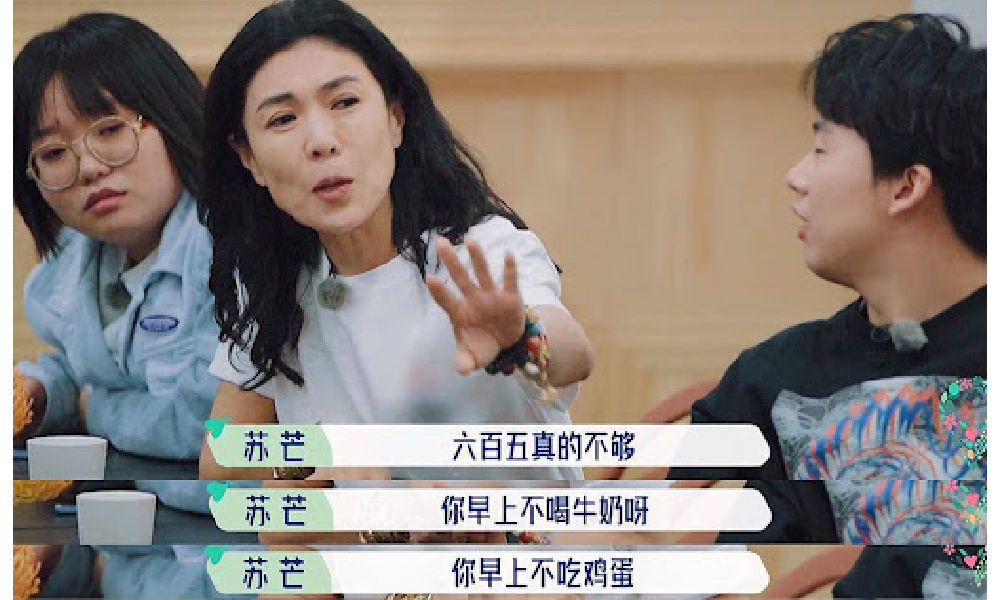
Photo of Su Mang claiming that 650 is not enough and questioning whether people have eggs and milk for breakfast in the variety show (via Sohu).
Not only do some Chinese celebrities seem to live in another world where everything costs more, but they also live in a place where “poverty” is differently defined.
Actor Wang Chuanjun (王传君) once shared in an interview that during his most financially challenging period, he just had 1 million yuan (about $140,000) left in his bank account, which caused him great distress.
Similarly, singer Eason Chan expressed unease during the Covid-19 pandemic when he had “only” 30 million in his bank account. (While the original report did not specify the currency, we assume it to be in HK dollars, which would be approximately $3.83 million.)

(Photo of the interview when Wang Chuanjun expressed his anxiety when finding out that he “only” had 1 million yuan left (via Baijiahao)
“It’s too divided,” one Weibo user wrote:
“On one side, there are individuals who earn 2.08 million yuan per day, lacking education and expertise, yet dominating a significant portion of public opinion with their extravagant life of luxury. On the other side, there is the marginalized lower class (probably including most of you and me) who are squeezed to the point of being voiceless, pushed to the brink of collapse and even driven to end their lives due to the pressure of just tens of thousands of yuan.”
In the thread below this post, one commenter provided an example to support the argument of individuals being driven to the point of ending their lives. They recounted a case that was recently disclosed by the court, involving a lonely elderly person who attempted suicide by consuming pesticides after being robbed of 45,000 yuan ($6,287).
One Weibo user provided a perspective from common individuals with a relatively average salary:
“Considering a monthly income of 5,000 yuan (about $700) and no expenses, it would be possible to accumulate 60,000 yuan ($8,383) in a year. Hypothetically, if someone were to retire at the age of 60 without any expenses, they could potentially have 3.6 million yuan (about $503,000) saved up.”
However, this already impractical scenario seems far from reality for many people across China, particularly those residing in smaller cities, who struggle to reach an annual salary of 60,000 yuan.
“I no longer know how to place trust in the notion that hard work guarantees success”
This striking disparity between the lifetime earnings of average salary earners and the daily earnings of celebrities evokes a sense of both indignation and helplessness. “Isn’t it absurd when some people discuss earning 2.08 million yuan per day? I also find it quite amusing. It’s genuinely pitiful and disheartening,” expressed the user in response to the calculations.
By this point, Zhang’s livestream comment about the ‘699 yuan socks’ has transcended a mere debate about whether she was flaunting her wealth or not. When coupled with other instances where celebrities divulge their astounding earnings and extravagant lifestyles, this incident has become catalyst for individuals to question the ideals of equality and meritocracy in society.
“I no longer know how to place trust in the notion that hard work guarantees success,” wrote one Weibo user.
In these online discussions about privilege and disillusionment with meritocracy, Xiangzi’s name frequently comes up. Xiangzi is a character in Lao She’s book “Rickshaw Boy.” He is a poor rickshaw puller who dreams of escaping the lower class and achieving wealth through hard work. Despite his persistent efforts, he faces continuous failures. In the end, he gives up on working hard and becomes a lazy good-for-nothing.
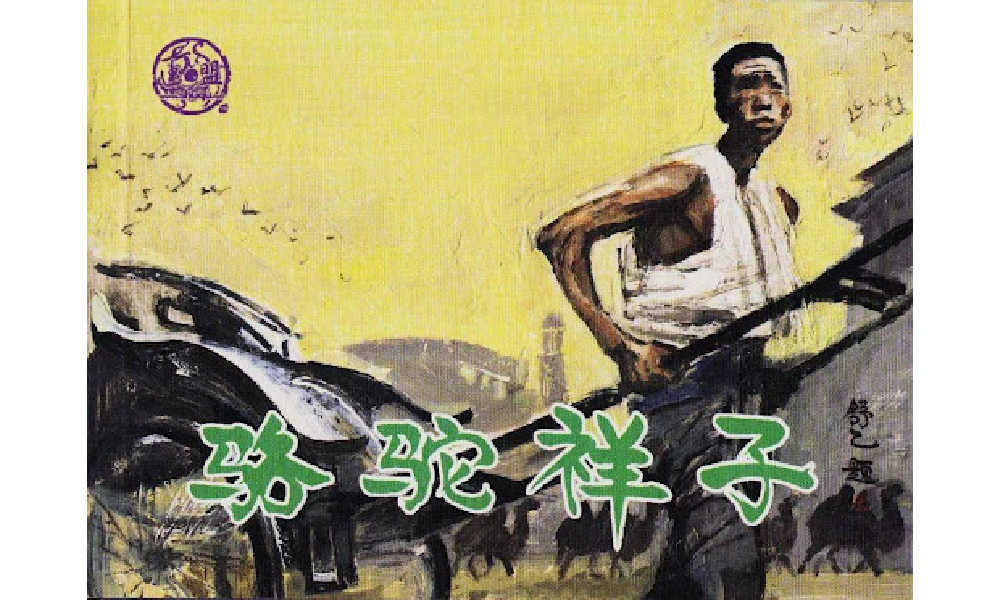
The book ‘Rickshaw Boy’ (骆驼祥子) by author Lao She.
“Is this still the era where hard work can change the future?” one commenter wonders.
It is clear that the extreme contrast between celebrity earnings and the average disposable income of ordinary people is a topic that many people care about. By now, the hashtag ‘Zhang Yuqi Says She Can’t Buy Socks for 669 Yuan’ (#张雨绮说699我都买不了袜子#) has garnered over 860 million views on Weibo while Zhang Yuqi’s apology received over 410 million clicks, and the influx of comments discussing wealth inequality in China shows no signs of stopping.
“Today I saw workers sleeping in the shade next to a supermarket in the scorching heat. Their faces looked thin, their clothes looked dirty,” one commenter wrote: “How ironic is it that they work so hard and may not even earn 699 yuan in a day? It makes you wonder, with such circumstances, how can societal hostility not increase? It’s a sick society.”
Also read: Online Discussions over Income: “When My Dad Was Young, His Monthly Salary Was 2000 Yuan (And I Still Earn the Same) [link here]
By Zilan Qian
Get the story behind the hashtag. Subscribe to What’s on Weibo here to receive our newsletter and get access to our latest articles:
Spotted a mistake or want to add something? Please let us know in comments below or email us. First-time commenters, please be patient – we will have to manually approve your comment before it appears.
©2023 Whatsonweibo. All rights reserved. Do not reproduce our content without permission – you can contact us at info@whatsonweibo.com.
Zilan Qian is a China-born undergraduate student at Barnard College majoring in Anthropology. She is interested in exploring different cultural phenomena, loves people-watching, and likes loitering in supermarkets and museums.

Also Read
China Arts & Entertainment
Jia Ling Returns to the Limelight with New “YOLO” Movie and 110-Pound Weight Loss Announcement
After a year away from the spotlight, Chinese actress and director Jia Ling is back, announcing both a new film and slimmer figure.
Published
7 months agoon
January 11, 2024
Chinese actress and director Jia Ling (贾玲) has been trending on Weibo thanks to her upcoming film YOLO (热辣滚烫) and her remarkable weight loss transformation.
Jia Ling is a famous Chinese comedian actress, known for her annual Spring Festival Gala performances. She has been especially successful in the previous years as she made her directorial debut in 2021 with the award-winning box office hit Hi, Mom (Chinese title Hi, Li Huanying 你好,李焕英), in which she also stars as the female protagonist. That same year, audiences saw her as Wu Ge in Embrace Again (穿过寒冬拥抱你).
It has been a while since we’ve heard from Jia Ling, but on January 11, she resurfaced with a Weibo post in which she explained her absence from the limelight.
In her post, Jia wrote that she has spent the entire year working on the YOLO (热辣滚烫) movie, for which she lost a staggering 100 jin (斤) (110 lbs/50 kg). Just as with Hi, Mum, Jia is both the director of YOLO and the lead actress.
According to Jia, it was a tiring and “hungry” year, during which she ended up “looking like a boxer.” She added that the movie, set to premiere during the Spring Festival, is not necessarily about weight loss at all, but about learning to love yourself.
Within a single day, Jia Ling’s post received nearly 60,000 replies and over 855,000 likes.

Jia Ling’s post on Weibo.
The topic became top trending due to various reasons. It is because fans are excited to see Jia Ling back in the limelight and are anticipating the upcoming movie, but also because they are eager to see Jia Ling’s transformation.
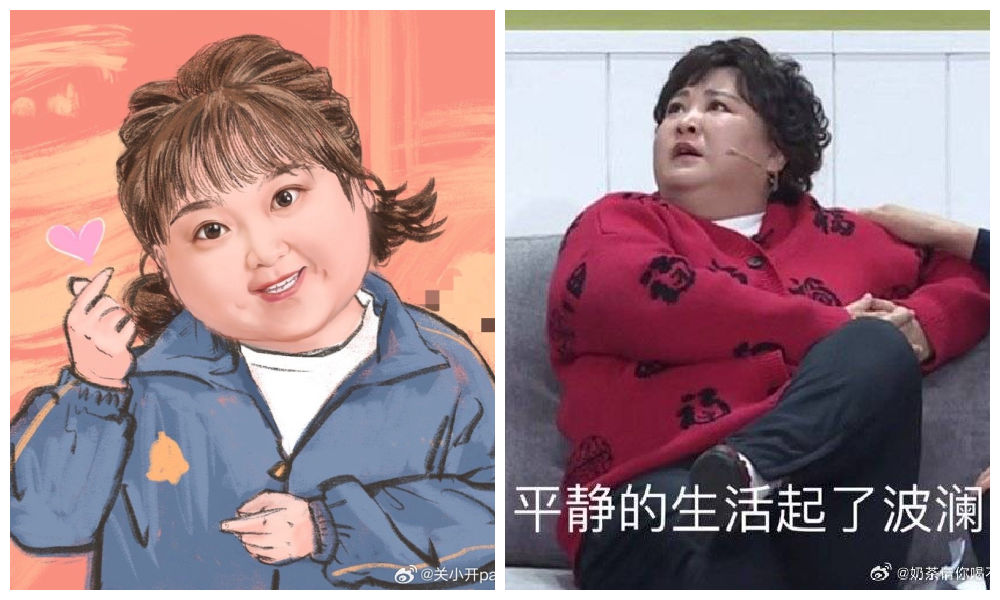
From fans on Weibo: Jia Ling fanart and a meme from one of her well-known Spring Festival performances.
A short scene from the movie showed Jia Ling’s slimmer appearance, and a screenshot of it went viral, with Weibo users saying they hardly recognized Jia anymore.
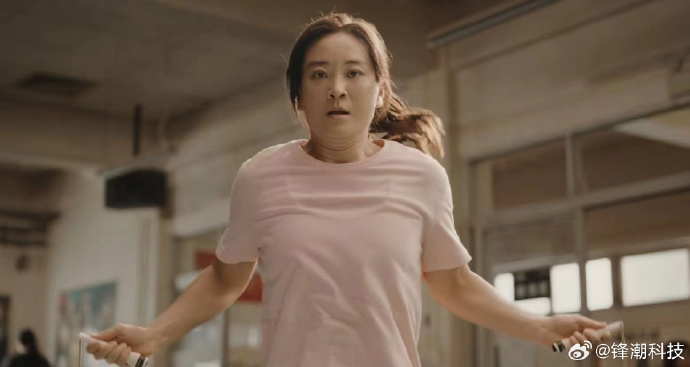
One hashtag related to Jia Ling’s weight loss, about expert views on losing so much weight in such a relatively short time, received over 450 million on Weibo on Thursday (#医生谈贾玲整容式暴瘦#).
Perhaps unsurprisingly, medical experts quoted by Chinese media outlets caution against rapid weight loss methods, recommending a more gradual approach instead.
Nevertheless, there is great interest in the extreme diets of Chinese celebrities. As discussed in an earlier article about China’s celebrity weight craze, the weight loss journey of Chines actors or influencers often capture widespread attention as people are keen to adopt diet plans promoted by celebrities.
YOLO (热辣滚烫), which will hit Chinese theaters on February 10, tells the story of Le Ying (乐莹), who has withdrawn from social life and isolated herself at home ever since graduation. Trying to get her life back on track, Le Ying meets a boxing coach. The meeting proves to be just the beginning of a new journey in life filled with unforeseen challenges.
The Spring Festival holiday typically sees peak box office numbers in China, making this movie highly anticipated, particularly after the success of Hi, Mum three years ago. On Weibo, many view Jia Ling’s weight loss as a testament to her dedication and are eager to see the results of her year-long efforts in the cinema next month.
By Manya Koetse
Get the story behind the hashtag. Subscribe to What’s on Weibo here to receive our newsletter and get access to our latest articles:
Spotted a mistake or want to add something? Please let us know in comments below or email us. First-time commenters, please be patient – we will have to manually approve your comment before it appears.
©2024 Whatsonweibo. All rights reserved. Do not reproduce our content without permission – you can contact us at info@whatsonweibo.com.
China Celebs
Three Reasons Why Lipstick King’s ‘Eyebrow Pencil Gate’ Has Blown Up
From beauty guru to betrayal: why one livestream moment is shaking China’s internet.
Published
11 months agoon
September 13, 2023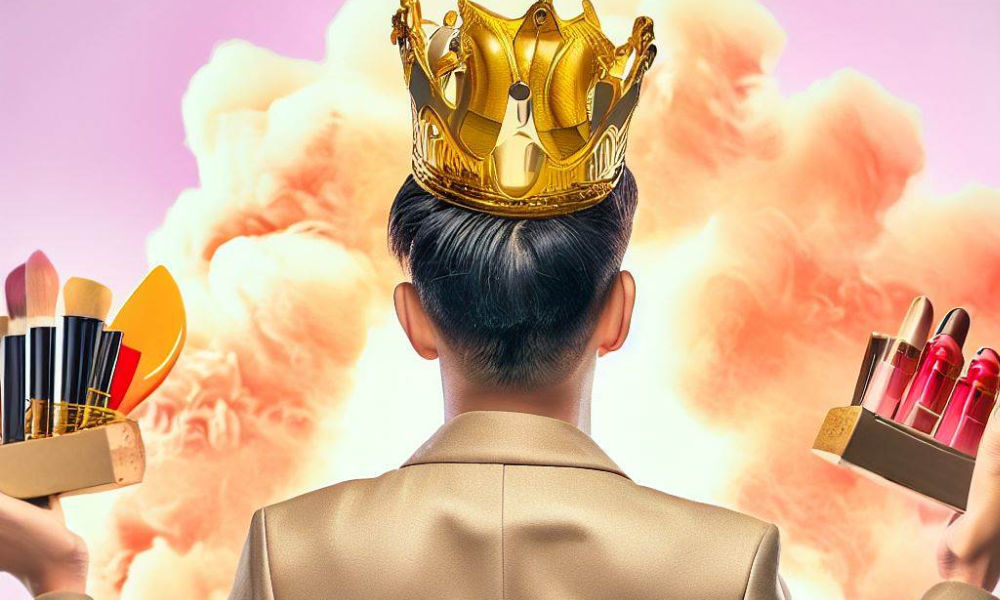
PREMIUM CONTENT
Li Jiaqi, also known as Austin Li the ‘Lipstick King,’ has become the focus of intense media attention in China over the past days.
The controversy began when the popular beauty influencer responded with apparent annoyance to a viewer’s comment about the high price of an eyebrow pencil. As a result, his fans began unfollowing him, netizens started scolding him, Chinese state criticized him, and the memes started flooding in.
Li Jiaqi’s tearful apology did not fix anything.
We reported about the incident here shortly after it went trending, and you can see the translated video of the moment here:
China's famous make-up influencer #LiJiaqi is in hot water due to an e-commerce livestream he did on Sunday. When viewers complained about an eyebrow pencil being too expensive (79 RMB/$10.9), he got annoyed, insisting that the product was not expensive at all. Translated video: pic.twitter.com/JDKGMKovDX
— Manya Koetse (@manyapan) September 11, 2023
The incident may seem minor at first glance. Li was merely promoting Florasis brand (花西子) eyebrow pencils, and some viewers expressed their opinion that the pencils, priced at 79 yuan ($11), had become more expensive.
In response, Li displayed irritation, questioning, “Expensive how?” He went on to suggest that viewers should also reflect on their own efforts and whether they were working hard enough to get a salary increase.
But there is more to this incident than just an $11 pencil and an unsympathetic response.
#1 The King Who Forgot the People Who Crowned Him
The initial reaction of netizens to Li Jiaqi’s remarks during the September 10th livestream was characterized by a strong sense of anger and disappointment.
Although celebrities often face scrutiny when displaying signs of arrogance after their rise to fame, the position of Li Jiaqi in the wanghong (internet celebrity) scene has been especially unique. He initially worked as a beauty consultant for L’Oreal within a shopping mall before embarking on his livestreaming career through Alibaba’s Taobao platform.
In a time when consumers have access to thousands of makeup products across various price ranges, Li Jiaqi established himself as a trusted cosmetics expert. People relied on his expertise to recommend the right products at the right prices, and his practice of personally applying and showcasing various lipstick colors made him all the more popular. He soon garnered millions of online fans who started calling him the Lipstick King.
By 2018, he had already amassed a significant fortune of 10 million yuan ($1.53 million). Fast forward three years, and his wealth had ballooned to an astonishing 18.5 billion yuan ($2.5 billion).
Despite his growing wealth, Li continued to enjoy the support of his fans, who appreciated his honest assessments of products during live testing sessions. He was known for candidly informing viewers when a product wasn’t worth buying, and the story of his humble beginnings as a shop assistant played a major role in why people trusted him and wanted him to succeed.
However, his recent change in tone, where he no longer seemed considerate of viewers who might find an $11 brow pencil to be expensive, suggests that he may have lost touch with his own customer base. Some individuals perceive this shift as a form of actual “betrayal” (背叛), as if a close friend has turned their back on them.

The viral cartoon shows Li Jiaqi going from a friendly beggar to angry rat.
One cartoon shared on social media shows Li Jiaqi, with mouse ears, as he initially begs his online viewers for money. However, as he becomes more prosperous, the cartoon portrays him gradually growing arrogant and eventually scolding those who helped him rise to fame.
Many people accuse Li of being insincere, suggesting that he revealed his true colors during that short livestream moment. This is also one of the reasons why most commenters say they do not believe his tears during his apology video.
“He betrayed China’s working class,” one popular vlog suggested.
#2 Internet Celebrity Crossing the Lines
Another reason why the incident involving Li Jiaqi is causing such a storm is related to the media context in which Chinese (internet) celebrities operate and what is expected of them.
Whether you are an actor, singer, comedian, or a famous livestreamer/e-commerce influencer, Chinese celebrities and performers are seen as fulfilling an exemplary role in society, serving the people and the nation (Jeffrey & Xu 2023). This is why, as explained in the 2019 research report by Jonathan Sullivan and Séagh Kehoe, moral components play such a significant role in Chinese celebrity culture.
In today’s age of social media, the role of celebrities in society has evolved to become even more significant as they have a vast reach and profound influence that extends to countless people and industries.
Their powerful influence makes celebrities important tools for authorities to convey messages that align with their goals – and definitely not contradict them. Through the media and cultural industries, the state can exert a certain level of control within the symbolic economy in which celebrities operate, as discussed by Sullivan and Kehoe in their 2019 work (p. 242).
This control over celebrities’ actions became particularly evident in the case of Li Jiaqi in 2022, following the ‘cake tank incident’ (坦克蛋糕事件). This incident unfolded during one of his livestreams when Li Jiaqi and his co-host introduced a chocolate cake in the shape of a tank, with an assistant in the back mentioning something about the sound of shooting coming from a tank (“坦克突突”). This livestream took place on June 3rd, on the night before the 33rd anniversary of the crackdown on the Tiananmen protests.
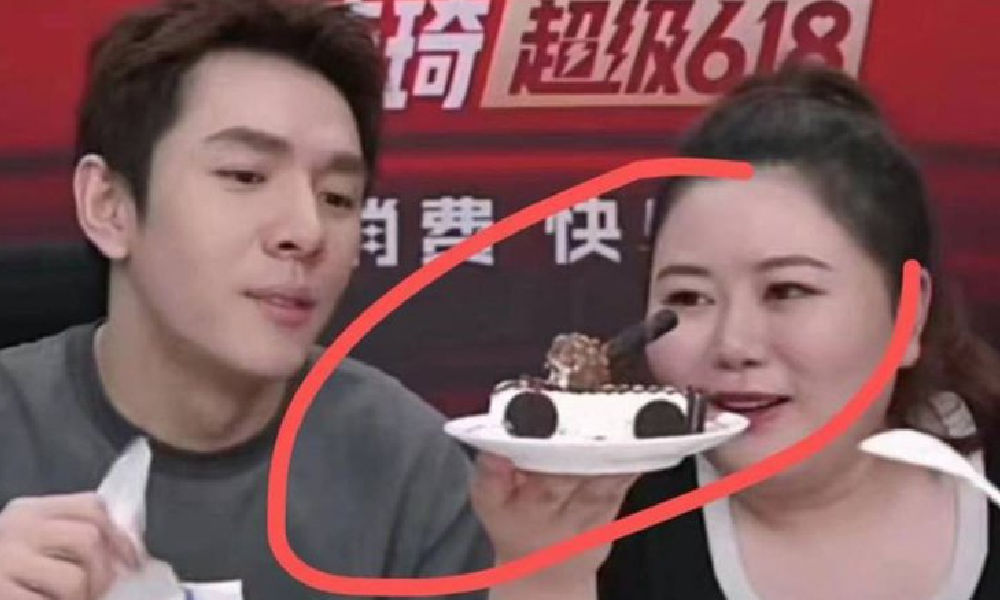
While Li Jiaqi did not directly touch upon a politically sensitive issue with his controversial livestream, his actions were perceived as a disregard for customer loyalty and displayed an arrogance inconsistent with socialist core values. This behavior garnered criticism in a recent post by the state media outlet CCTV.
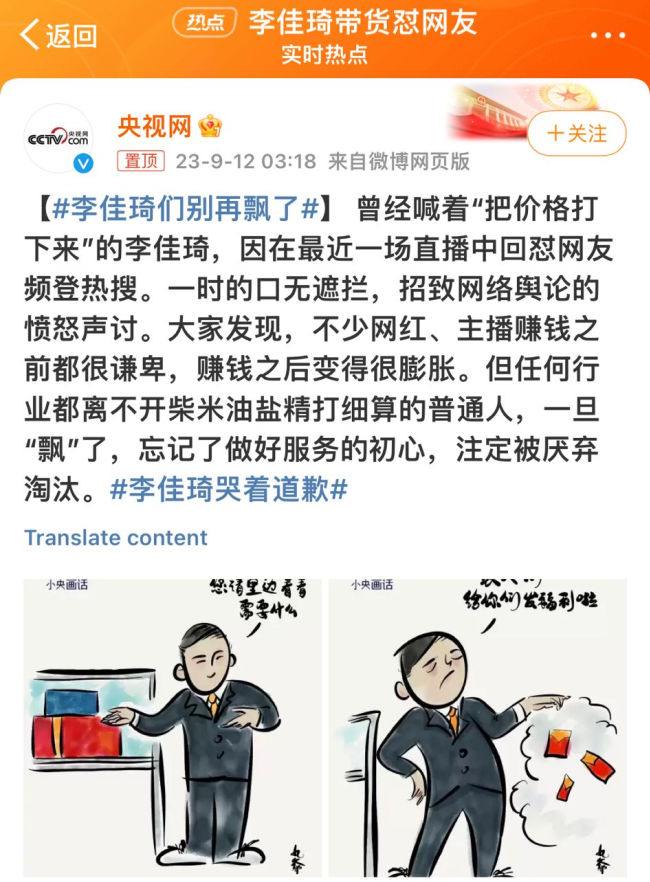
Post by CCTV condemning Li’s behavior.
Other state media outlets and official channels have joined in responding to the issue, amplifying the narrative of a conflict between the ‘common people’ and the ‘arrogant influencer.’
#3 Striking a Wrong Chord in Challenging Times
Lastly, Li Jiaqi’s controversial livestream moment also became especially big due to the specific words he said about people needing to reflect on their own work efforts if they cannot afford a $11 eyebrow pencil.
Various online discussions and some media, including CNN, are tying the backlash to young unemployment, tepid consumer spending, and the ongoing economic challenges faced by workers in China.
Since recent years, the term nèijuǎn (‘involution’, 内卷) has gained prominence when discussing the frustrations experienced by many young people in China. It serves as a concept to explain the social dynamics of China’s growing middle class who often find themselves stuck in a “rat race”; a highly competitive education and work environment, where everyone is continually intensifying their efforts to outperform one another, leading to this catch 22 situation where everyone appears to be caught in an unending cycle of exertion without substantial progress (read more here).
Weibo commenters note that, given China’s current employment situation and wage levels, hard work is not necessarily awarded with higher income. This context makes Li Jiaqi’s comments seem even more unnecessary and disconnected from the realities faced by his customers. One Shanghai surgeon responded to Li’s comments, saying that the fact that his salary has not increased over the last few year certainly is not because he is not working hard enough (#上海胸外科医生回应李佳琦言论#).
Some observers also recognize that Li, as an e-commerce professional, is, in a way, trapped in the same cycle of “inversion” where brands are continuously driving prices down to such low levels that consumers perceive it as the new normal. However, this pricing strategy may not be sustainable in the long run. (Ironically, some brands currently profiting from the controversy by promoting their own 79 yuan deals, suggesting their deal is much better than Li’s. Among them is the domestic brand Bee & Flower 蜂花, which is offering special skin care products sets for 79 yuan in light of the controversy.)
Many discussions therefore also revolve around the question of whether 79 yuan or $11 can be considered expensive for an eyebrow pencil, and opinions are divided. Some argue that people pay much more for skincare products, while others point out that if you were to weigh the actual quantity of pencil color, its price would surpass that of gold.
The incident has sparked discussions about the significance of 79 yuan in today’s times, under the hashtag “What is 79 yuan to normal people” (#79元对于普通人来说意味着什么#).
People have shared their perspectives, highlighting what this amount means in their daily lives. For some, it represents an entire day’s worth of home-cooked meals for a family. It exceeds the daily wages of certain workers, like street cleaners. Others equate it to the cost of 15 office lunches.
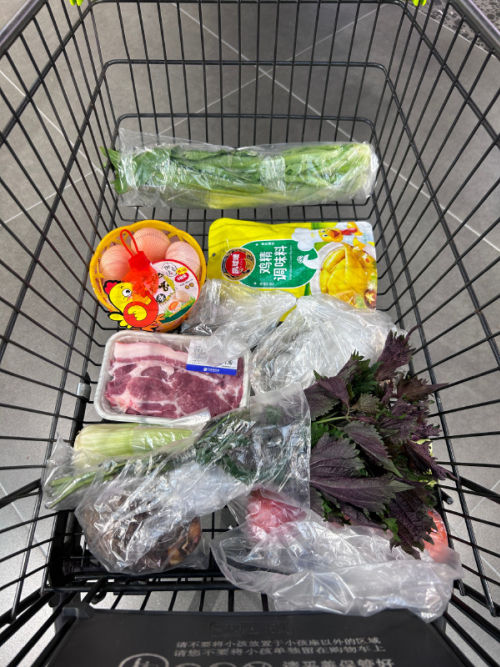
One netizen posts 79 yuan ($10.9) worth of groceries.
Amid all these discussions, it also becomes clear that many people are trying to live a frugal live in a time when their wages are not increasing, and that Li’s comments are just one reason to vent their frustrations about the situation they are in, In those regards, Li’s remarks really come at a wrong time, especially coming from a billionaire.
Will Li be able to continue his career after this?
Some are suggesting that it is time for Li to take some rest, speculating that Li’s behavior might stem from burn-out and mental issues. Others think that Li’s hardcore fans will remain loyal to their e-commerce idol.
For now, Li Jiaqi must tread carefully. He has already lost 1.3 million followers on his Weibo account. What’s even more challenging than regaining those one million followers is rebuilding the trust of his viewers.
Update: On September 19, the Florasis/Huaxizi brand finally apologized for its late response to the controversy, and the brand stated that the controversy provided an opportunity for them to listen to “the voice of their consumers.” Their decision to release a statement seemed fruitful: they gained 20,000 new followers in a night.
By Manya Koetse
with contributions by Miranda Barnes
Jeffreys, Elaine, and Jian Xu. 2023. “Governing China’s Celebrities.” Australian Institute of International Affairs, 18 May https://www.internationalaffairs.org.au/australianoutlook/governing-chinas-celebrities/ [12 Sep 2023].
Sullivan, Jonathan, and Séagh Kehoe. 2019. “Truth, Good and Beauty: The Politics of Celebrity in China.” The China Quarterly 237 (March): 241–256.
Spotted a mistake or want to add something? Please let us know in comments below or email us. First-time commenters, please be patient – we will have to manually approve your comment before it appears.
©2023 Whatsonweibo. All rights reserved. Do not reproduce our content without permission – you can contact us at info@whatsonweibo.com.
Subscribe

Weibo Watch: The Future is Here

“Bye Bye Biden”: Biden’s Many Nicknames in Chinese

Enjoying the ‘Sea’ in Beijing’s Ditan Park

A Triumph for “Comrade Trump”: Chinese Social Media Reactions to Trump Rally Shooting

Weibo Watch: Get Up, Stand Up

The Tragic Story of “Fat Cat”: How a Chinese Gamer’s Suicide Went Viral

“Old Bull Eating Young Grass”: 86-Year-Old Chinese Painter Fan Zeng Marries 36-Year-Old Xu Meng

A Brew of Controversy: Lu Xun and LELECHA’s ‘Smoky’ Oolong Tea

Singing Competition or Patriotic Fight? Hunan TV’s ‘Singer 2024’ Stirs Nationalistic Sentiments

Zara Dress Goes Viral in China for Resemblance to Haidilao Apron

Weibo Watch: The Battle for the Bottom Bed

About the “AI Chatbot Based on Xi Jinping” Story

China’s Intensified Social Media Propaganda: “Taiwan Must Return to Motherland”

Weibo Watch: Telling China’s Stories Wrong

Saying Goodbye to “Uncle Wang”: Wang Wenbin Becomes Chinese Ambassador to Cambodia
Get in touch
Would you like to become a contributor, or do you have any tips or suggestions? Get in touch here!
Popular Reads
-

 China Insight3 months ago
China Insight3 months agoThe Tragic Story of “Fat Cat”: How a Chinese Gamer’s Suicide Went Viral
-

 China Music4 months ago
China Music4 months agoThe Chinese Viral TikTok Song Explained (No, It’s Not About Samsung)
-

 China Digital10 months ago
China Digital10 months agoToo Sexy for Weibo? Online Discussions on the Concept of ‘Cābiān’
-

 China Arts & Entertainment12 months ago
China Arts & Entertainment12 months agoBehind 8 Billion Streams: Who is Dao Lang Cursing in the Chinese Hit Song ‘Luocha Kingdom’?




